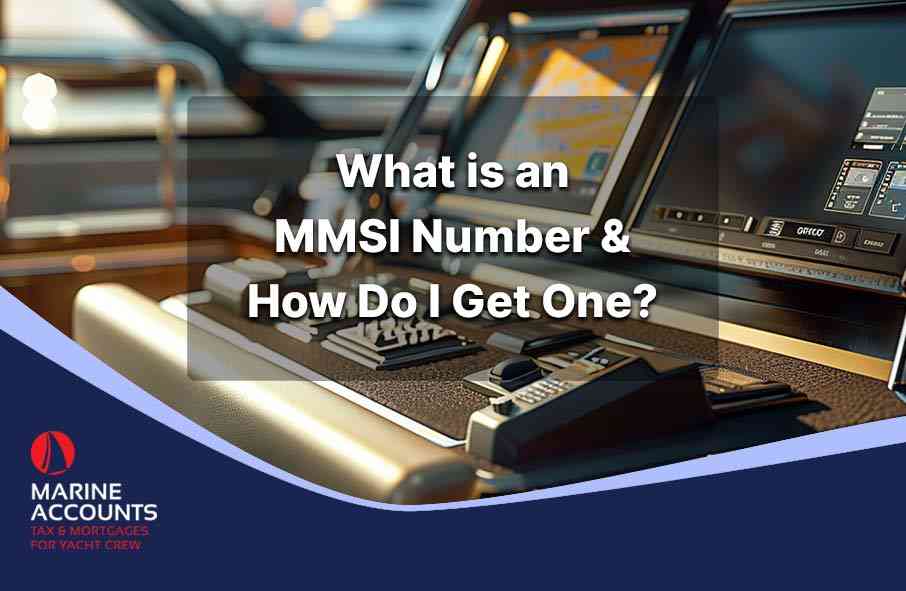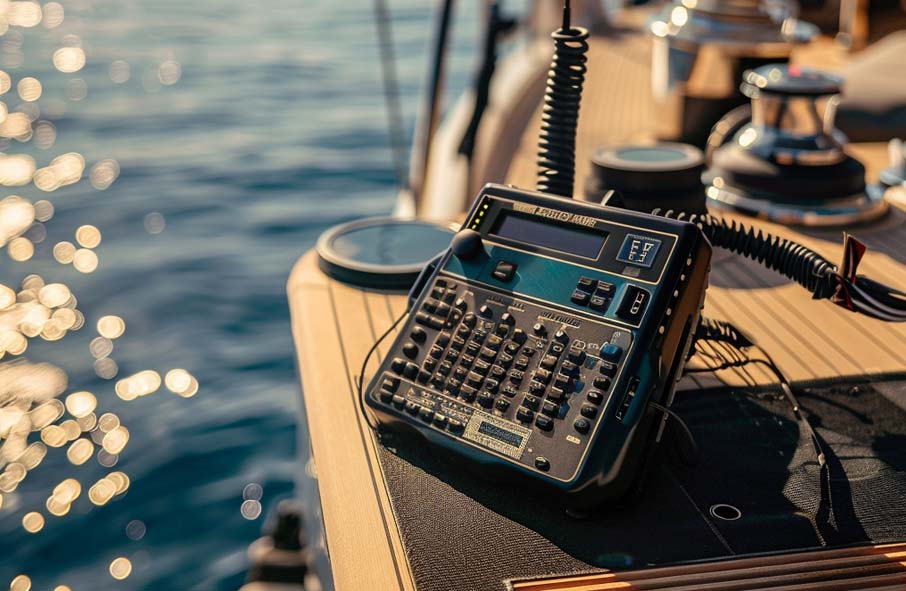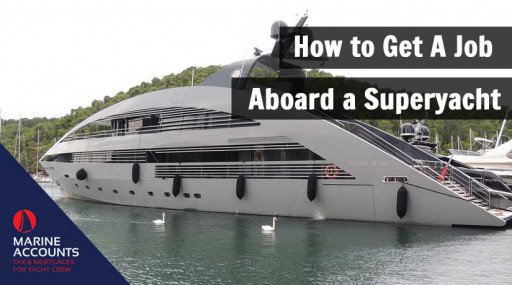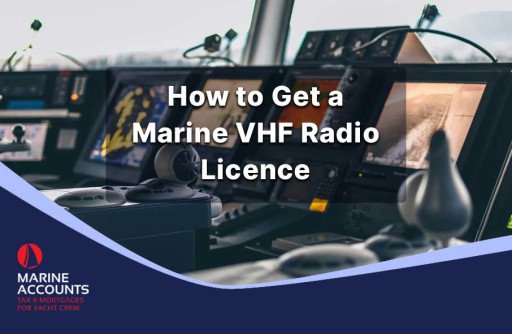What is an MMSI Number & How Do I Get One?
- Authors
-
-

- Name
- Patrick Maflin
-

Having a marine VHF radio is of utmost importance as it ensures the safe navigation of vessels and communications during all times.
It gives peace of mind in emergency situations by being used as a means of communication with port or harbour authorities, coastguards and other sea vessels.
Every ship radio must have a registered licence and what is referred to as an MMSI number.
Chapters
- What is a Maritime Mobile Service Identity (MMSI) Number?
- What is an MMSI Number for?
- What’s the Difference Between an MMSI & an IMO Number?
- Different Types of Maritime Mobile Service Identities
- MMSI Digits & Categories
- Station Identity Formats
- Frequently Asked Questions
- Conclusion
What is a Maritime Mobile Service Identity (MMSI) Number?
MMSI stands for Maritime Mobile Service Identity number.
This number is issued to all new ship radio and ship portable radio licences.
An MMSI number is composed of a series of nine digits.
The MSSI numbers are used to uniquely identify a radio station.
When a DSC message is sent with the radio, the MMSI number will be automatically included.
MMSI numbers have a standard format.
It identifies the type of station, along with the country of registration and the identity of the sea vessel.
What is an MMSI Number for?

MMSI numbers are used for identification purposes but mainly for communication and security reasons.
The MMSI will be programmed in all VHF devices found on board sea vessels.
They are used for the following:
- AIS - Automatic Identification System
- MOB - Man Over Board
- DSC - Digital Selective Calling
- EPIRB - Emergency Position Indicating Repeater Beacon
What’s the Difference Between an MMSI & an IMO Number?
As a direct result of a rise in global trade activity, there are many ships on the sea, and thus identification systems for such vessels are of utmost importance.
This is why there are MSSI numbers, as well as IMO numbers.
These two identifiers are used for marine shipping, and there are some distinct differences between them.
An IMO number is a reference number that is assigned to every vessel for identification purposes.
IMO stands for International Maritime Organisation, and each vessel will have IMO followed by a unique seven digit number.
The IMO number is unique and permanent.
Hence it will remain the same for a vessel throughout its life, starting from its construction, until it is scrapped.
This number will not change even if the ship changes ownership, name or flag.
The IMO can never be reassigned to another vessel either.
The IMO number is mandatory in case of:
- Propelled seagoing ships that have a GT of 100 tons or more
- Fishing vessels as from 2013
- Reefers
- Supply vessels that are at least 12 metres in length
- Smaller, non-steel hull vessels as from 2016
On the other hand the following ships do not require an IMO number:
- Pleasure crafts
- Ships that offer a special service, such as hopper barges, search and rescue vessels and lightships
- Warships, troopships, and similar sea vessels that are used for military transportation
- Non-motorised ships
- Wooden ships
- Air-cushion vehicles like hydrofoils and hovercrafts
- Floating docks and similar structures
The MMSI number is a nine digit number used for marine traffic monitoring systems.
It comprises the MID, which is the Maritime Identification Digits, followed by six digits.
The MID specifies the nationality.
Unlike the IMO number, a ship’s MMSI number can change should the flag change, as each country has its MID.
Thus a sea vessel might have a unique IMO number which is linked to several MMSI numbers during its lifetime.
While both the IMO and MMSI numbers are used to identify ships, they have different uses.
The IMO number is recognised by most governments.
It helps to improve the transparency of records, and allows national authorities to manage vessels that are flying their flags, while also enhancing operational performance and monitoring.
The MMSI number is programmed in all VHF devices found on sea vessels so as to serve as a unique and internationally standardised identifier for all communications.
Thus, the main difference between MMSI and IMO is that the former is used for communication, whereas the latter is more prevalent to improve safety, surveillance and fights against fraud.
Different Types of Maritime Mobile Service Identities
There are six main types of maritime mobile service identities, namely:
- Ship station identities
- Group ship station identities
- Coast station identities
- Group coast station identities
- SAR aircraft
- Navigational aids and craft that are associated with the parent ship
MMSI Digits & Categories

The Maritime Identification Digits consist of three digits.
They always range between 2 and 7, the number being assigned regionally.
The initial digits of the MMSI will categorise the identity, such as:
- 0 is used for ship group, the coast station or for a group of coast stations
- 1 is used for SAR aircraft
- 2 is for Europe
- 3 for North and Central America, and Caribbean
- 4 for Asia, excluding the southeast
- 5 for Australia, New Zealand, Philippines and Indonesia
- 6 for Africa
- 7 for South America
- 8 for handheld VHF transceiver with DSC and GNSS
- 9 for devices which use a free-form number identity
Station Identity Formats
The ship station identities have a format consisting of nine digits.
There are different station identity formats as follows:
MIDxxxxxx
The MID is followed by any digits from 0 to 9.
There will be three trailing zeros included in case the ship is fitted with an Inmarsat B, C or M ship earth station, or will be equipped with such in the near future.
MIDxxx000
This is the format used in case the ship has an Inmarsat C ship earth station.
MIDxxxxx0
This is when the ship is fitted with an Inmarsat A ship earth station or has satellite equipment that is not Inmarsat.
In such a case there will be no trailing zeroes.
There are also Group Ship station call identities to be able to call more than one ship simultaneously.
The format in this case is 0MIDxxxxx.
00MIDxxxx
This is the format used in In the case of Coastal Station identities.
For Group coast station call identities the format will be 00MID0000 in the case of any coast station using the MID, or 009990000 for any VHF coast station.
Frequently Asked Questions

How Do I Get an MMSI Number?
You can get a new MMSI number when you are applying to get a license for your vessel with Ofcom.
The application can be found online via the Ofcom website.
When the MMSI number is registered, Ofcom will also inform the ITU and the MCA of this number.
How Long is an MMSI Licence Valid For?
An MMSI licence will remain valid for the life cycle of that vessel.
In case the vessel is sold then the owner would need to surrender the licence.
Can I Transfer My Existing Licence to my New Vessel?
The simple answer to this question is no.
Since licences are non transferable, you will not be able to transfer the existing license to a new vessel.
Since the call sign and MMSI number will remain with a vessel throughout its life, you would need to apply for a new licence in your name in this case.
What Must I Do If I Sell My Vessel?
In this case you would need to surrender your licence.
This is because such licences are not transferable.
The MMSI number will stay with that particular sea vessel it was originally issued for for life.
I'm an employee aboard a yacht. Will it have an MMSI number?
Absolutely! For any yacht crew to work aboard a private yacht or charter yacht, the vessel will and must have a valid MMSI number for the captain and bridge crew to use during transit.
I’m a yacht steward. Will I need to use the yacht’s VHF radio?
Usually the ship’s VHF radio is operated by the yacht’s main navigational crew. However, acquiring training to use marine radio is advisable to improve your skills whilst working aboard a ship. Courses are available via the RYA website, which cover the correct procedures in operating VHF and VHF Digital Selective Calling (DSC) equipment on any British flagged vessel.
Conclusion
We hope that through this article we have tackled most common questions regarding MMSI numbers, as well as any misconceptions that one might have had.
It is important to be aware of the points outlined above if you own a sea vessel, as the MMSI number is a fundamental part of such ownership.
However, if you have questions about the subjects discussed in this article or any other aspects about yachting, then get in touch with our knowledgeable team.
Disclaimer: Any advice in this publication is not intended or written by Marine Accounts to be used by a client or entity for the purpose of (i) avoiding penalties that may be imposed on any taxpayer or (ii) promoting, marketing or recommending to another party matters herein.






